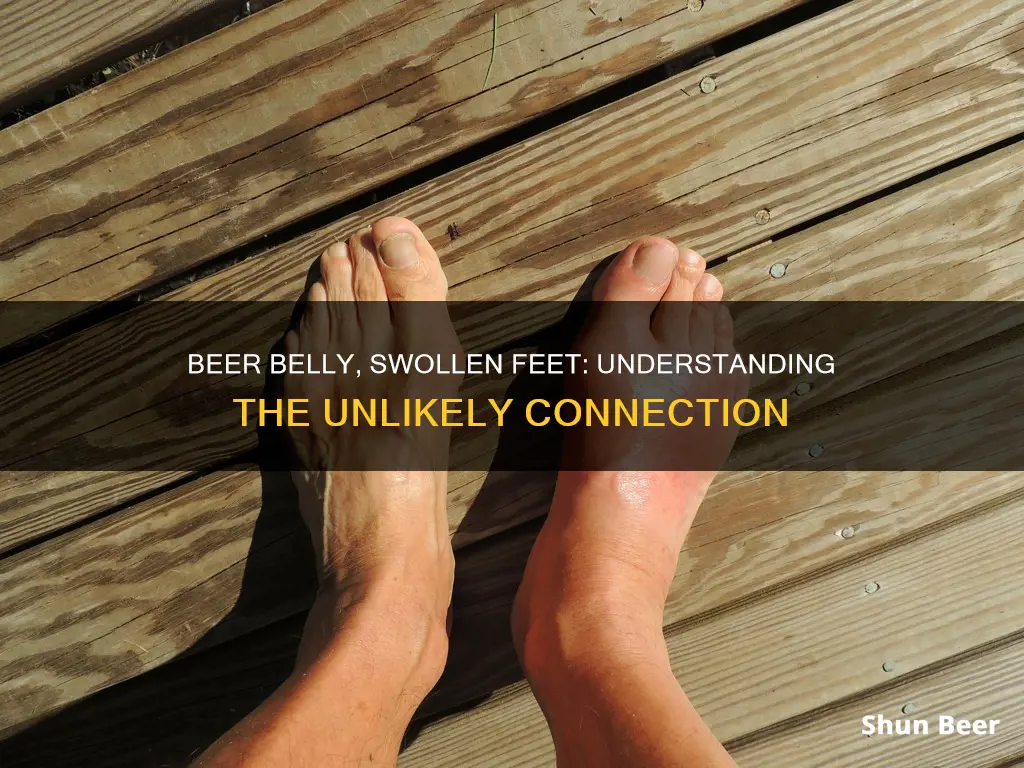
Alcohol can indeed cause your feet to swell up. This is due to a condition called edema, which is caused by water retention in the body. Edema is most common in the legs, ankles, and feet, but it can also occur in other parts of the body, such as the face, hands, and stomach. Alcohol's diuretic properties encourage the kidneys to produce more urine, leading to dehydration and swollen feet. Additionally, alcohol decreases the production of vasopressin, a hormone that signals the kidneys to reabsorb water rather than flush it out. With less vasopressin, more water is lost through urination, and the body starts to retain extra fluid to compensate. This fluid can pool in the feet and ankles due to gravity, leading to swelling known as peripheral edema. While this swelling usually subsides within a couple of days, recurrent or persistent swelling could indicate a more serious underlying health issue, such as heart, liver, or kidney problems.
What You'll Learn

Alcohol and Edema
Edema is the medical term for swelling caused by water retention. While edema is most common in the legs, ankles, and feet, it can occur in other parts of the body, such as the face, hands, and stomach.
Drinking alcohol, especially in excessive quantities, can cause edema. This is due to alcohol's diuretic properties, which cause the body to produce more urine and lead to dehydration. As the body becomes dehydrated, it starts to draw water from the cells into the bloodstream, leading to fluid retention and swelling. This swelling, known as peripheral edema, often occurs in the feet and ankles due to gravity.
In most cases, edema caused by alcohol consumption is not serious and will go away within a couple of days. However, recurrent or persistent swelling may be a sign of a more serious underlying issue, such as:
- Heart problems: Congestive heart failure can cause blood flow to slow down, leading to increased pressure within the veins and fluid leakage into the surrounding tissues, resulting in swelling.
- Liver damage: Excessive alcohol consumption can lead to liver damage, which can cause a decrease in the production of albumin, a protein that helps keep fluid in the bloodstream. When albumin levels drop, fluid can escape into the surrounding tissues, causing edema.
- Kidney disease: The kidneys are responsible for releasing excess fluid from the body. When they are not functioning properly, fluid can build up and cause swelling.
If you experience swollen feet after drinking alcohol, there are several steps you can take to reduce or avoid this:
- Drink alcohol in moderation.
- Avoid excessive salty food.
- Drink water along with alcoholic beverages to reduce dehydration.
- Elevate your legs and wear compression socks or stockings.
If you experience frequent edema due to your drinking habits and have trouble cutting back, it is recommended to seek medical advice.
Non-Alcoholic Beer: Safe for Minors?
You may want to see also

Alcoholic Neuropathy
Drinking beer or any other alcoholic drink in excess can lead to swollen feet. This is due to a condition called edema, which is caused by water retention in the body. While this is usually not serious and goes away within a couple of days, it could indicate a larger issue if it persists.
The exact cause of alcoholic neuropathy is unknown, but it is believed to be a result of both direct poisoning of the nerve by alcohol and the effect of poor nutrition associated with alcoholism. Alcohol inhibits the absorption of key nutrients such as thiamine (vitamin B1), which is important for carbohydrate metabolism and neuron development.
Symptoms of alcoholic neuropathy include:
- Numbness in the arms and legs
- Abnormal sensations, such as pins and needles
- Painful sensations in the arms and legs
- Muscle problems, including weakness, cramps, aches, or spasms
- Heat intolerance, especially after exercise
- Erection problems (impotence)
- Problems urinating, incontinence, feeling of incomplete bladder emptying, difficulty beginning to urinate
- Constipation or diarrhea
- Problems swallowing or talking
- Unsteady gait (walking)
The most important step in treating alcoholic neuropathy is to stop consuming alcohol. Abstaining from alcohol can help restore nutritional health, improve symptoms, and prevent further nerve damage. However, some alcohol-induced nerve damage may be permanent. Treatment options may also include medications, cognitive behavioural therapy, counselling, and support groups.
Beer Distributors: The Logistics of Getting Beer to Customers
You may want to see also

Alcohol and Heart Problems
One specific condition caused by long-term heavy alcohol use is alcohol-induced cardiomyopathy, where the heart changes shape, leading to long-term damage and heart failure. This occurs when excessive drinking causes the heart muscles to stretch and enlarge, weakening the heart muscle and reducing its ability to pump blood effectively. This results in a decreased oxygen supply to the body. Alcohol-induced cardiomyopathy can affect anyone who consumes too much alcohol and is more likely in those with alcohol use disorders or specific genetic mutations.
The good news is that limiting alcohol intake can significantly reduce the risk of developing alcohol-related heart problems. For women, it is recommended to limit consumption to seven drinks per week, and for men, the recommendation is 14 drinks per week. Abstaining from alcohol or reducing intake to moderate levels can help prevent and even reverse some of the damage caused by excessive drinking.
In addition to its direct effects on the heart, excessive alcohol consumption can also contribute to obesity and related health issues. Alcohol is a source of excess calories and can lead to weight gain, which can further increase the risk of heart disease.
While moderate drinking may not be harmful to the heart, heavy drinking can have serious consequences. It is important to drink in moderation, and for those with certain heart conditions or abnormalities, abstaining from alcohol may be necessary.
Beer and Covid: What's Safe to Drink?
You may want to see also

Alcohol and Liver Damage
Alcohol-related liver disease (ARLD) refers to liver damage caused by excess alcohol intake. The liver is one of the most complex organs in the body, performing functions such as filtering toxins from the blood, aiding digestion, regulating blood sugar and cholesterol levels, and helping fight infection and disease.
When we drink alcohol, the liver breaks it down. However, if we consume more than the liver can process, it can become badly damaged. Each time the liver filters alcohol, some liver cells die, and while the liver can develop new cells, prolonged alcohol misuse over many years can reduce its ability to regenerate, resulting in serious and permanent damage.
There are three main types of alcohol-associated liver disease:
- Steatotic (fatty) liver: This is the most common alcohol-induced liver problem, caused by the build-up of fat inside the liver cells, leading to an enlarged liver. It often has no symptoms.
- Acute hepatitis: Alcohol-associated hepatitis is an acute inflammation of the liver, resulting in liver cell death and permanent scarring.
- Cirrhosis: Alcohol-associated cirrhosis is the destruction of healthy liver tissue, which is replaced by scar tissue. This can cause the liver to stop functioning correctly.
The chances of developing liver disease increase the longer one drinks and the more alcohol one consumes. It is worth noting that alcoholic liver disease does not occur in all heavy drinkers, and there may be possible genetic links. The disease is most common in people between 40 and 50 years of age, with men being more likely to develop the problem. However, women may develop the disease after less exposure to alcohol than men.
The symptoms of alcoholic liver disease may vary depending on the severity of the condition and how long one has been drinking. Early symptoms can include poor appetite, weight loss, and the appearance of small, red spider-like blood vessels on the skin. As the condition progresses and liver function worsens, symptoms may include:
- Fluid buildup in the legs (edema) and abdomen (ascites)
- Yellowing of the skin, mucous membranes, or eyes (jaundice)
- Redness on the palms of the hands
- In men, impotence, shrinking of the testicles, and breast swelling
- Easy bruising and abnormal bleeding
- Confusion or problems with thinking
- Pale or clay-colored stools
- Bleeding in the gastrointestinal tract
If you regularly drink alcohol to excess, it is important to consult your healthcare provider so they can check if your liver has been damaged. The most effective way to prevent ARLD is to stop drinking alcohol or stick to the recommended limits. With complete alcohol avoidance, the liver can often heal some of the damage caused by alcohol. However, in severe cases, a liver transplant may be required.
Beer and Hives: Is There a Connection?
You may want to see also

Alcohol and Kidney Disease
Drinking alcohol can cause swelling in the feet, ankles, and hands, a condition known as edema, which is caused by water retention in the body. While this is usually not serious and tends to go away within a couple of days, it can sometimes indicate a more serious underlying problem, such as kidney disease.
The kidneys play a crucial role in filtering harmful substances from the blood, including alcohol. They also regulate fluid levels in the body. When an individual consumes excessive amounts of alcohol, it can affect the kidneys' ability to perform these functions properly. Here are some ways in which alcohol consumption can impact kidney health:
- Changes in Kidney Function: Alcohol can alter the normal function of the kidneys, making them less effective at filtering the blood.
- Dehydration: Alcohol has dehydrating properties, and this drying effect can impact the normal function of cells and organs, including the kidneys. Dehydration can also lead to increased water retention, resulting in edema.
- High Blood Pressure: Excessive alcohol consumption is linked to high blood pressure, which is a common cause of kidney disease. More than two drinks per day can increase the risk of developing high blood pressure.
- Liver Disease: Chronic alcohol consumption can lead to liver disease, which adds to the workload of the kidneys. Liver disease impairs the body's ability to regulate blood flow to the kidneys, affecting their ability to filter the blood effectively.
- Acute Kidney Injury: Binge drinking, typically defined as consuming four to five drinks within two hours, can cause a sudden drop in kidney function known as acute kidney injury. While this condition often resolves with time, it can sometimes lead to lasting kidney damage.
- Chronic Kidney Disease: Regular heavy drinking significantly increases the risk of developing chronic kidney disease. This risk is even higher for individuals who smoke and drink excessively.
- Medication Interactions: Alcohol interacts with various medications, including those for diabetes, heart disease, sleep, and pain. These interactions can impact kidney health and function.
- Hormonal Disruption: Alcohol can disrupt hormones that affect kidney function, such as vasopressin, which regulates water retention and urination.
It is important to note that moderate alcohol consumption, typically defined as one standard drink per day for women and one to two drinks per day for men, does not appear to increase the risk of developing kidney disease. However, for individuals with existing kidney disease, it is crucial to monitor alcohol intake and be mindful of the potential downstream effects on the body.
Fish and Beer: A Curious Friendship
You may want to see also
Frequently asked questions
Drinking alcohol can cause swelling in the feet and ankles, also known as edema, due to water retention in the body. This is caused by the body's reaction to the dehydrating properties of alcohol.
Swelling in the feet from drinking beer will generally go away within a couple of days as your body processes and removes alcohol from your system.
If the swelling in your feet continues for more than 2 days or occurs frequently, it could be a sign of an underlying issue with your heart, liver, or kidneys, and you should consult a doctor.







